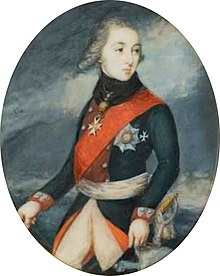Karl August Christian of Mecklenburg
Karl August Christian, Duke of Mecklenburg [-Schwerin], actually: Karl, Duke of Mecklenburg (* July 2, 1782 in Ludwigslust ; † May 22, 1833 ibid) was a soldier and fought as a general in Russian service against Napoleon's troops.
Life
Duke Karl (August Christian) came from the Mecklenburg-Schwerin line of the Mecklenburg Princely House . He was the third eldest son of the heir to the throne, Duke (reigning since 1785) and later Grand Duke Friedrich Franz I (1756–1837) and his wife Luise (1756–1808), daughter of Johann August von Sachsen-Coburg.
At the age of six, on January 8, 1789, he received a prebend as canon at Lübeck Cathedral . Soon after the marriage of his eldest brother Friedrich Ludwig zu Mecklenburg with the Russian Grand Duchess Helena Pawlowna Romanowa , he entered Russian service. After a rapid rise he became major general and commander of a regiment stationed in Smolensk in 1805 . The following year he was promoted to lieutenant general and moved to Prussia with the corps of General Levin August von Bennigsen . Here he was seriously wounded in June 1807 in the Battle of Heilsberg . After the Peace of Tilsit he returned to Russia and was used against the Turks in the final phase of the Russo-Turkish War in 1811. During the Russian campaign in 1812 he was given command of a brigade in the 2nd Grenadier Division and was wounded again during the Battle of Borodino as part of the 8th Army Corps (General Borosdin ). On October 31, 1812 he was promoted to lieutenant general and then fought in the battles at Malojaroslawetz , Vjasma and Krasnoi . In 1813 he took part in the battles of Großgörschen , Bautzen , Dresden and Kulm and in October 1813 in the so-called Battle of the Nations near Leipzig . In the campaign of 1814 he fought in the Battle of Brienne , La Rothière , Bar-sur-Aube and Laon and took part in the capture of Paris .
At the beginning of May 1814, after defeating Napoleon Bonaparte , he resigned his service and retired to Ludwigslust, where he also died. From July 11th to August 3rd, 1822 he stayed for a spa treatment in the Mineralbad zu Goldberg .
In 1811 he took the five-year-old son of a fallen Turkish soldier into his house, had him baptized in the name of Carl Gustav Janus and provided for his education. Janus later became a forester in Backendorf (today Bakendorf , district of Gammelin near Hagenow ).
Awards
- St. Alexander Nevsky Order
- Order of St. Vladimir
- Order of St. Anne
- Bailli and Commander of the Order of St. John
literature
- Friedrich Brüssow: Carl August Christian, Duke of Mecklenburg-Schwerin . In: New Nekrolog der Deutschen. Volume 11/1, Weimar 1835, p. 382 f. ( Digitized version ).
Web links
- Literature about Duke Karl (August Christian) in the state bibliography MV
- Karl August Christian of Mecklenburg-Schwerin
proof
- ^ Wolfgang Prange : Directory of the Canon. In: Ders .: Bishop and cathedral chapter of Lübeck: Hochstift, principality and part of the country 1160-1937. Lübeck: Schmidt-Römhild 2014 ISBN 978-3-7950-5215-7 , p. 420 No. 416; the Lübeck cathedral chapter was a predominantly Lutheran institution. There were hardly any obligations associated with the benefices . Like all canons living in 1803, he kept the income from the prebend even after the secularization of the Lübeck bishopric in the Reichsdeputationshauptschluss for life
- ↑ Order of Battle of the Imperial Russian Armies ( Memento of the original from March 10, 2010 in the Internet Archive ) Info: The archive link was automatically inserted and not yet checked. Please check the original and archive link according to the instructions and then remove this notice.
- ^ A. Becker: News about the steel bath at Goldberg in Mecklenburg-Schwerin. 1862, p. 19.
| personal data | |
|---|---|
| SURNAME | Karl August Christian of Mecklenburg |
| ALTERNATIVE NAMES | Karl August Christian (full name); Mecklenburg, Karl August Christian zu (wrong name form) |
| BRIEF DESCRIPTION | Duke of Mecklenburg, Russian general |
| DATE OF BIRTH | July 2, 1782 |
| PLACE OF BIRTH | Ludwigslust |
| DATE OF DEATH | May 22, 1833 |
| Place of death | Ludwigslust |
